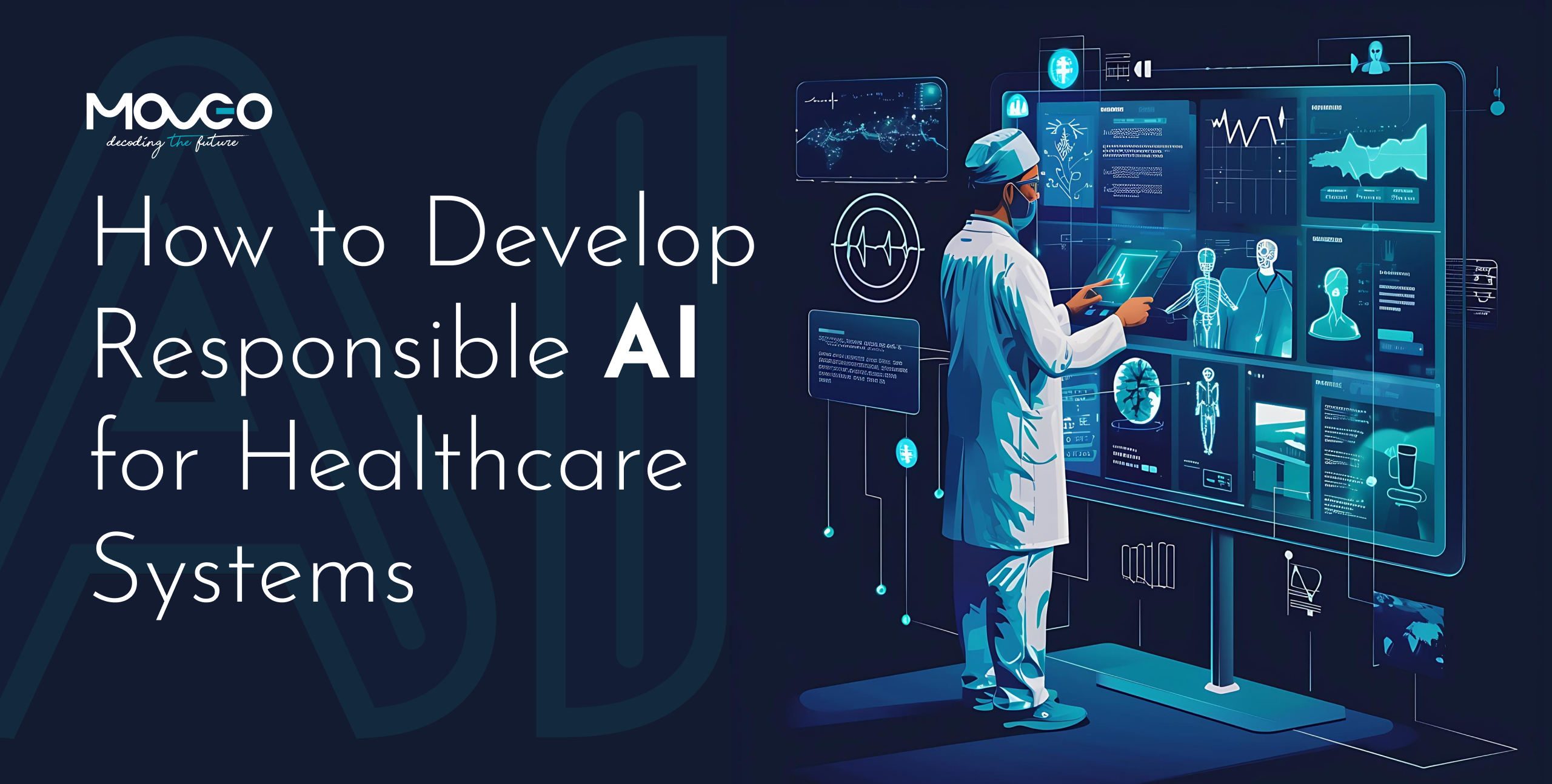“The current inflection point of AI in healthcare is an opportunity the health care sector cannot afford to miss. Success, however, will hinge on the field’s ability to stem feelings of fear and mistrust that could arise.”
That’s what a panel of experts from American Health Association say about the increasing role of AI in healthcare.
That in a nutshell describes what the world’s outlook should be regarding AI in healthcare. AI is already transforming healthcare industry by driving scientific breakthroughs and revolutionizing patient care. As much as 36% of activities in health and social care could be automated using AI. These productivity gains would reduce the projected deficit of 3.5 million health professionals required by 2030 across the world.
By analyzing vast amounts of data, AI can uncover genetic variations that explain differing responses to treatments, thereby personalizing medical care. It aids in diagnosing and managing diseases, accelerates drug development, controls healthcare costs, and promotes health equity. AI’s ability to quickly identify patterns and insights that human analysis would take much longer, enhances our understanding of disease and patient responses.
Healthcare App Development and AI
Healthcare app development has been on a consistent rise right from the time the App Store first launched. The global mHealth apps market size was estimated at USD 32.42 billion in 2023 and is expected to reach USD 37.48 billion in 2024. Developers have relentlessly worked on healthcare app development, to improve healthcare delivery across borders and make people’s lives easier. Healthcare apps make quality healthcare accessible to patients in remote locales or otherwise distanced from the healthcare systems. Doctors and caregivers use apps to organize patient information, manage workload, and delegate mundane tasks.
How AI Can Improve Healthcare Services and Benefit All Parties
The integration of AI into healthcare offers a multitude of benefits that improve patient outcomes, advance medical research, and create more efficient and equitable healthcare systems. AI can reduce medical errors due to miscommunication (an estimated at 30% of all errors). While the possibilities are endless, here’s a synopsis of what AI can do for healthcare:
Precision in Diagnostics
One of the most significant advantages of AI in healthcare is its ability to enhance diagnostic precision. By analyzing medical images and patient data with unparalleled accuracy, AI can detect diseases at their earliest stages, leading to timely treatments, improving patient outcomes and saving lives.
Personalized Treatment Plans
AI excels in creating personalized treatment plans tailored to individual patients. By analyzing data such as genetic information, lifestyle factors, and medical history, AI ensures that each patient receives the most effective treatment with minimal side effects.
Faster Drug Discovery
By simulating interactions between drug compounds and biological systems, AI significantly reduces the time and cost involved in developing new medications. This rapid innovation brings life-saving treatments to market faster than ever before.
Enhancing Patient Monitoring
For patients with chronic conditions, continuous monitoring is crucial. AI-powered tools provide real-time data analysis, allowing healthcare providers to detect potential health issues early and intervene promptly.
Optimizing Clinical Workflows
AI is a game-changer when it comes to optimizing clinical workflows. By automating routine administrative tasks such as scheduling, documentation, and billing, AI reduces the burden on healthcare professionals. This efficiency allows them to dedicate more time to patient care.
Predicting Patient Outcomes
Predicting patient outcomes is another area where AI shines. By analyzing large datasets of patient histories and treatment responses, AI helps healthcare providers anticipate complications and adjust treatment plans proactively.
Advancing Medical Research
AI is advancing medical research by sifting through vast amounts of scientific literature and data to uncover new insights. This capability accelerates the pace of research and innovation, leading to the development of groundbreaking therapies and medical technologies that push the boundaries of modern medicine.
Outbreak Tracking and Prevention
AI’s ability to monitor and analyze data from various sources allows for the early detection of disease outbreaks and the tracking of infectious diseases, enabling quicker and more effective public health responses and containment strategies.
All of the above are advantages hard to overlook. However, if history has taught us anything, it is that too much of a good thing can get bad very quickly. Therefore, it is crucial to keep the tempting powers of AI in check, and ensure strict regulation, to keep the concerns at bay.
Concerns Around AI in Healthcare Systems
However, as AI unlocks these opportunities, it is crucial to maintain a focus on ethics and patient welfare. What we need today is responsible AI Principles, ensuring that AI is used ethically to maximize its potential benefits.
Despite its advantages, the integration of AI in healthcare raises many moral and ethical concerns. Some major concerns posed by AI in healthcare systems are:
Patient Privacy and Data Security
As AI systems often require access to vast amounts of sensitive personal health information, increasing the risk of data breaches.
Bias
There is also a potential for bias in AI algorithms, which can lead to unequal treatment and exacerbate existing health disparities. If the data used to train these systems is not representative of diverse populations, the algorithm may underserve certain demographics.
Trust and Transparency
The lack of transparency in AI decision-making processes also poses a challenge, as it can be difficult for patients and healthcare providers to understand and trust the recommendations made by AI.
Loss of Human Touch
Another ethical dilemma remains the displacement of healthcare workers by AI technologies. Overdependence on AI systems can lead to the loss of human touch in patient care. Threats to job security also affect morale and in turn affect patient care.
All these concerns point to an urgent need for robust regulatory frameworks and ongoing ethical scrutiny to ensure that the benefits of AI in healthcare are realized without compromising patient rights and well-being. AI based healthcare app development is one of the strongest sub-industries of the tech sector right now and now is the time to enforce checks on responsible AI development for healthcare systems, so we don’t end up putting the cart before the horse.
But How Do We Develop Responsible AI For Healthcare Systems?
For AI to fulfil its potential responsibly and ethically, it is crucial to adhere to guiding principles that prioritize health equity, clinical relevance, and patient-centric care. AI can be developed and implemented in healthcare to ensure it serves the greater good, offering practical strategies for overcoming existing obstacles and maximizing benefits for all populations. This involves not only leveraging AI to enhance medical outcomes but also ensuring that its deployment addresses the deep-seated inequities in healthcare systems.
By focusing on inclusive and equitable access to AI technologies and promoting transparent, shared decision-making processes, we can harness AI’s transformative power while safeguarding patient trust and well-being. This comprehensive approach will help us realize AI’s full potential in creating a more resilient, efficient, and just healthcare system.
Design AI to Address Health Disparities
AI tools should aim to reduce existing health disparities rather than worsen them. For instance, AI in healthcare often benefits those who already have access to high-quality care, potentially widening the equity gap.
To combat this, AI tools must be designed to ensure that disadvantaged groups can equally access and benefit from them. This involves using diverse and inclusive datasets, developing affordable and accessible AI solutions, and prioritizing tools that cater to diverse populations. So instead of training AI on just datasets consisting of majoritarian population (example – white people in America). African Americans, Asians, Indians, and all relevant ethnicities must be included.
Reduce Overdiagnosis and Overtreatment
AI tools should aim to minimize overdiagnosis and overtreatment, which can lead to unnecessary stress and medical costs for patients. AI tools should be developed to differentiate between cases that require intervention and those that do not. This approach can help tailor treatments more appropriately, reducing the burden of unnecessary medical procedures and improving patient recovery.
Maximize Healthcare Value
AI tools should offer high healthcare value by improving outcomes without escalating costs. This means that AI solutions should be cost-effective and deliver significant health benefits. Developers should consult with healthcare leaders and economists to ensure that AI tools are financially viable and do not divert resources from more critical areas. In resource-limited settings, it is particularly important to ensure that AI tools provide clear benefits and do not strain already scarce resources.
Tailor AI to Local Populations
AI tools should be designed to be easily adapted to local populations rather than aiming for broad generalizability. This means using data that is relevant and reliable for specific communities and creating models that can be retrained for local conditions. By focusing on local needs and contexts, AI tools can deliver more precise and effective healthcare solutions.
Conclusion
All things in moderation – that sounds like a good philosophy for integrating AI in healthcare. While AI can optimize and improve all processes in healthcare bringing a host of improvements for patients, doctors, caregivers, and everyone involved, uncontrolled use of AI can lead to major problems that can even jeopardize lives. It is therefore imperative that AI and healthcare app developers exercise utmost responsibility in the way they utilize AI in healthcare systems.
Having said that, following the outlined principles to develop responsible, ethical, and well-regulated AI solutions can lead to inclusive healthcare delivery, improved patient outcomes, and significant cost reductions.


